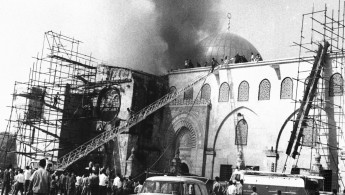Israel's assault on al-Aqsa mosque 'worst since 1969'
It is conceivable that the Israeli authorities have chosen to stage an unprecedented escalation in Jerusalem and al-Aqsa Mosque deliberately on the 22nd anniversary of the Oslo Agreements.
The storming of the mosque, which has sustained significant damage, with dozens of Palestinian worshippers and activists injured, has brought back to the people of Jerusalem memories of the huge fire that destroyed large parts of the mosque in August 1969.
However, there is one fundamental difference today: when an Australian Jew set fire to al-Aqsa mosque 46 years ago, the entire Arab and Muslim world rose up in protest. Now, the mosque has slipped to the bottom of their priorities.
If the timing is indeed not innocent, with the assaults on Sunday starting hours before the Jewish new year celebrations, then one explanation could be that Israel is trying to assert its sovereignty over Jerusalem.
Israel could also be pressing ahead with a plan to divide prayer time and space in the mosque, after cracking down on the Palestinian activist groups that defend the mosque against Israeli incursions.
| Israel is trying to assert its sovereignty over Jerusalem |
Mahmoud Abu Atta, an activist closely involved with al-Aqsa affairs, told al-Araby al-Jadeed: "The violence by the Israeli police at al-Aqsa and Muslims risks taking the entire region into a new territory."
He added: "All indications suggest Israel....will impose a division of [prayer] times at al-Aqsa before introducing physical division between Muslims and Jews."
Abu Atta expected further escalation from Israel in tandem with the Jewish holidays.
For his part, Sheikh Azzam al-Khatib, director of the Islamic Endowments of Jerusalem, told al-Araby al-Jadeed: "What happened will go down in history as a black day, in which occupation soldiers assaulted the guards and employees of the Endowments Authority, and attacked both clerics and worshippers."
According to activists at the mosque, a senior Israeli officer told them Israel would henceforth crack down on them every time they try to stop the settlers.
The activists worked hard on Sunday to deal with the damage left by the fires they say were started by the Israeli forces. Several fires were started in mutiple places in the mosque compound, before the activists put them out.
Amr Radwan, head of the heritage and manuscripts department at al-Aqsa, said that 32 windows in the mosque were completely destroyed or damaged, in addition to doors and carpets across the site.
| The damage at al-Aqsa is the worst since 1969, and will need three years of work to repair - Amr Radwan |
He said what happened at al-Aqsa on Sunday has not happened since 1969. Radwan also said the damage will need three years of continuous work to repair.
Observers believe the recent escalation is a milestone when it comes to Israeli attacks on al-Aqsa.
They place it in the context of the relentless Israeli drive to appropriate Jerusalem, expel its native Arab residents and settle Israeli Jews in the city, including in the predominantly Arab East Jerusalem.
In addition, analysts say Israel is seeking to alter the status quo in al-Aqsa ias well as in the city. Although the Oslo agreements only allow Jewish worshippers to pray at the Wailing Wall, outside the Aqsa compound, Israelis have been trespassing into the mosque regularly over the past several years.
Mahmoud al-Muharib, political analyst, told al-Araby al-Jadeed: "There are 15 Israeli associations that help settlers and tourists illegally enter al-Aqsa Mosque, to stress that the site does not belong to Muslims and Arabs alone."
This is also the belief of Hanna Issa, secretary general of the Islamic Christian Committee for the Support of Jerusalem and Holy Sites, who spoke to al-Araby al-Jadeed.
Issa said that there is nothing left to negotiate with Israel when it comes to Jerusalem, since the occupation has already appropriated and settled the capital of the future Palestinian state.
He said: "When they were signed, the Oslo Agreement stated that final status negotiations regarding Jerusalem would start within five years."
"However, Israel reneged on all agreements signed with Egypt, Jordan and the Palestinian Authority on Jerusalem," he added, pointing out that the Palestinian negotiators will have nothing to negotiate about when it comes to the holy city.



